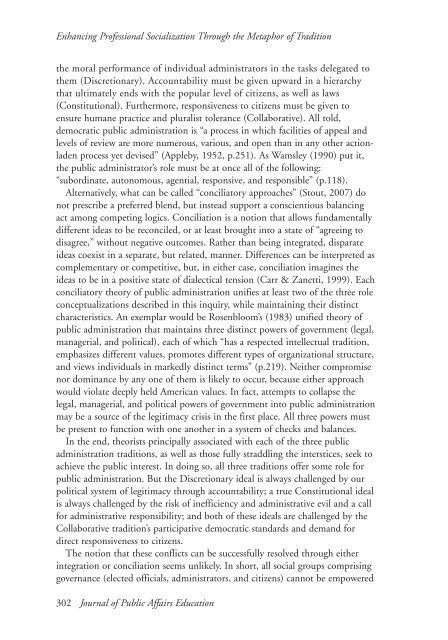JOURNAL OF PUBLIC AFFAIRS EDUCATION - naspaa
JOURNAL OF PUBLIC AFFAIRS EDUCATION - naspaa
JOURNAL OF PUBLIC AFFAIRS EDUCATION - naspaa
Create successful ePaper yourself
Turn your PDF publications into a flip-book with our unique Google optimized e-Paper software.
Enhancing Professional Socialization Through the Metaphor of Tradition<br />
the moral performance of individual administrators in the tasks delegated to<br />
them (Discretionary). Accountability must be given upward in a hierarchy<br />
that ultimately ends with the popular level of citizens, as well as laws<br />
(Constitutional). Furthermore, responsiveness to citizens must be given to<br />
ensure humane practice and pluralist tolerance (Collaborative). All told,<br />
democratic public administration is “a process in which facilities of appeal and<br />
levels of review are more numerous, various, and open than in any other actionladen<br />
process yet devised” (Appleby, 1952, p.251). As Wamsley (1990) put it,<br />
the public administrator’s role must be at once all of the following:<br />
“subordinate, autonomous, agential, responsive, and responsible” (p.118).<br />
Alternatively, what can be called “conciliatory approaches” (Stout, 2007) do<br />
not prescribe a preferred blend, but instead support a conscientious balancing<br />
act among competing logics. Conciliation is a notion that allows fundamentally<br />
different ideas to be reconciled, or at least brought into a state of “agreeing to<br />
disagree,” without negative outcomes. Rather than being integrated, disparate<br />
ideas coexist in a separate, but related, manner. Differences can be interpreted as<br />
complementary or competitive, but, in either case, conciliation imagines the<br />
ideas to be in a positive state of dialectical tension (Carr & Zanetti, 1999). Each<br />
conciliatory theory of public administration unifies at least two of the three role<br />
conceptualizations described in this inquiry, while maintaining their distinct<br />
characteristics. An exemplar would be Rosenbloom’s (1983) unified theory of<br />
public administration that maintains three distinct powers of government (legal,<br />
managerial, and political), each of which “has a respected intellectual tradition,<br />
emphasizes different values, promotes different types of organizational structure,<br />
and views individuals in markedly distinct terms” (p.219). Neither compromise<br />
nor dominance by any one of them is likely to occur, because either approach<br />
would violate deeply held American values. In fact, attempts to collapse the<br />
legal, managerial, and political powers of government into public administration<br />
may be a source of the legitimacy crisis in the first place. All three powers must<br />
be present to function with one another in a system of checks and balances.<br />
In the end, theorists principally associated with each of the three public<br />
administration traditions, as well as those fully straddling the interstices, seek to<br />
achieve the public interest. In doing so, all three traditions offer some role for<br />
public administration. But the Discretionary ideal is always challenged by our<br />
political system of legitimacy through accountability; a true Constitutional ideal<br />
is always challenged by the risk of inefficiency and administrative evil and a call<br />
for administrative responsibility; and both of these ideals are challenged by the<br />
Collaborative tradition’s participative democratic standards and demand for<br />
direct responsiveness to citizens.<br />
The notion that these conflicts can be successfully resolved through either<br />
integration or conciliation seems unlikely. In short, all social groups comprising<br />
governance (elected officials, administrators, and citizens) cannot be empowered<br />
302 Journal of Public Affairs Education
















